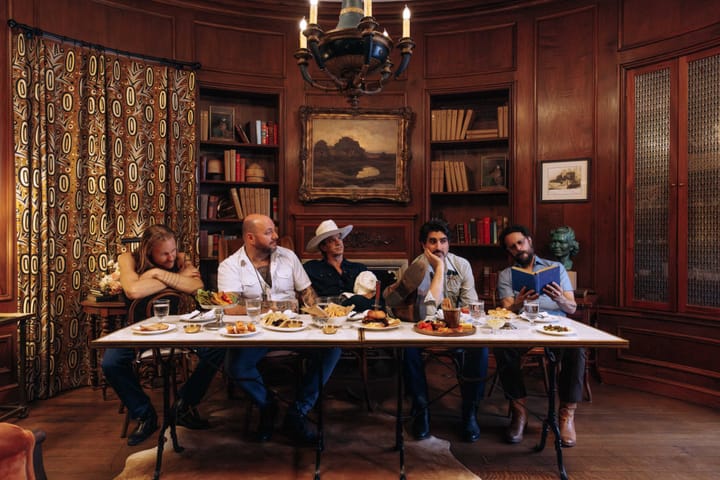When I joined the T-Bones back in the early 1990s, I was appalled to discover they couldn’t play covers. What sort of “country band”--genuinely from the country, to boot--could not fill a night with country and western classics, rockabilly, Cash covers, and so on? At the least, couldn’t they try adding a little Cold Chisel, or even AccaDacca to win over the leery punters?
Remember, this was before anyone had heard of alt-country.
But, here they were, these wide-eyed boys from the Murray River outposts of Robinvale and Euston. They were churning out song after song of uniquely Australian themes, defying the calls for Khe San, and filling dance floors with their saw dust stomp, straight-ahead guitars, and unromantic sentiment torn from flannel.
What became clear was that the original T-Bones--songwriting collaborators and life-long mates Andrew "Pip" Pupillo and Charlie Wilde--grew up writing songs, not covering them. Sure, they tipped their hats to the greats, but they didn’t bother copying them.
Before Barnsey tried and failed, the Boners were Australia’s Springsteen or Cougar-Mellencamp, celebrating provincial ordinariness, finding poetry in the dusty blue collar existence of 45-degree [Celsius] heatwaves, shot-up roadsigns and speed-baked truck stops, traversing the contradictory lure and alienation of cities, marvelling at the eternal mystery of women, and despairing at the violence in men. Before ABC-TV discovered the slide guitar as the motif for stories about the bush, the T-Bones had already defined an aural image of drought, shimmering horizons and cooked engine blocks. Before John Fogerty sang about playing centrefield, the T-Bones were singing about footy--the frozen mud trudge to the 'G in July; the Melbourne Bitter taste of defeat; the inevitable fight in the pub; the woeful and beloved Tigers getting smashed week after week.
(In fact, footy historians might like to track the parallel fortunes of the T-Bones and the Richmond Football Club. The Tigers have not won a flag since the T-Bones began playing to the cocksure roustabouts and backpacker grape-pickers at the Robinvale Hotel back in the late 1980s.)
Over time, the T-Bones created their own unique anthems that would become cult classics in their adopted town of Melbourne. They helped spawn a new breed of uniquely Melbourne roots music that married rockabilly, country and blues, and embraced the themes of Australiana that were once reviled as kitsch and decidedly uncool. Sure, not having a trusty repertoire of standards made some gigs pretty tough. (The band was once chased out of Tamworth because the crowd didn’t get these long-haired city boys playing what is ironically only now being celebrated at the so-called Country Music Festival: original, unapologetic, distinctly Australian music.)
The T-Bones have always been the masters of understatement, and their latest offering--coming ten years after 2004's Lowdown--reinforces the band’s unique brand of bone-dry irony and idiom.
A Long Time Coming is the seventh album by the T-Bones, in a remarkable body of work spanning four decades.
In fact, the Boners would have to be arguably one of the country’s most enduring bands, spreading what music scribe John Mangan once dubbed “The Sunraysia Sound” across countless sweat-drenched country bloodhouses and hip inner Melbourne pubs. And, the unique songwriting partnership between Pip and Charlie also endures. Pip has always kept things pretty simple--his lyrics are bush poetry, and his themes remain true. His lyrics talk about the modern day migration of bored young folk to cities, the getting of inner urban wisdom, the sense of tribal identity provided by cars, footy, pubs, tattoos. Sure, they are sentimental in their way, but they avoid being mawkish and they don’t try too hard. In fact, that could be the T-Bone slogan.
The characters, by and large, are ordinary, or at least "flawdinary". They miss the bush, but are drawn to the city and always fall for its charms. The modern day existentialism of “working for the man” is reflected in the boilermaker at the Smorgons melt-shop, stuck between city and country, innocence and experience.
By way of comparison, A Long Time Coming comes after a time in which most bands would have otherwise formed, written, recorded, sacked the lead singer, had families, toured, busted up, gone to rehab, re-formed and done nostalgia tours, and released Best-Of DVD sets. For the T-Bones, it has probably just meant they never got around to it. But they have never stopped gigging. Like every other period, when it comes to planning, writing and recording an album, they do it their way, and the loyal fans will always love them for it. In keeping with the family theme, the new album even features guest spots by Charlie's daughter Loretta Wilde on piano accordion. (I remember baby-sitting Loretta in the 1990s.)
Supporting the stalwarts Pip and Charlie, the rock-solid groove is maintained by Alics Gate-Eastley on bass and Miles McNicol on drums, both of whom have been with the band for the relatively short period of the past 10 years. A dose of pedal steel, courtesy of Garret Costigan, injects a new and entirely welcome dimension to the sound, and long-time T-Bone side-kicks James Stewart (guitar) and Hugh Martin (Hammond) clearly could not be kept away from the fray.
To say the latest T-Bones album has been a long time coming is like saying it gets hot in Mildura.
And, by the way, they still don’t play covers.
Editor's Note: This article was written by former T-Bones drummer Jim Carden. Used with permission of the author.


![SPOTLIGHT: Big Richard - "Alaska" [VIDEO]](/content/images/size/w720/2026/02/Spotlight-Template-6.png)


Comments ()